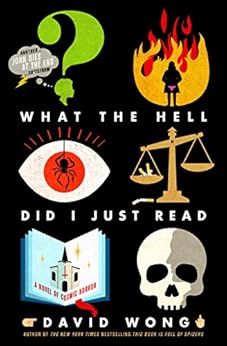
The novel begins simply enough. Three private investigators of the supernatural (David, John and Amy, who tend not to receive compensation for their work) look into the case of an abducted child. A stranger had threatened to take the man's daughter and seems to have done so. The abductor is a shape changer and leads the investigators on a wild chase, finding a child's faux cell phone that one can talk into and see photos on. The novel grows increasingly complex due to the nature of the horror getting our heroes to question the reality of what they are witnessing. While I may not be fully convinced that ending follows, the novel is highly readable.
I've perused definitions of cosmic horror, but few satisfy. For me it's where SF meets horror: wild speculation explains the crazy horror that's been loosed on the page. Usually, these are the most fascinating passages in Lovecraft's longer pieces, such as in The Mountains of Madness (I thought I had mentioned my favorite passage in the link, but mostly I critique Lovecraft's style).
Wong's novel isn't quite cosmic or quite horror by my estimate. The horror is dispelled in part by humor and situations that don't nail the dread and despair. The protagonist narrator does have his own philosophy, which is fascinating as it intersects existentialism and pop culture. A few samples (in the first, Wong discusses a painting of a clown who slowly mouths something):
as far as I'm concerned, if the object isn't killing anybody, it isn't "cursed." I've had it in the junk room for four months and it hasn't inconvenienced me once.and
Let me tell you what's bullshit about every supernatural horror movie. Whenever the monster or angry ghost lady turns up, everyone is skeptical for at least the first third of the running time. It's usually between forty and fifty minutes in that the protagonists begrudgingly admit that the ominous Latin chants emanating from the walls aren't a plumbing issue. In real life, the very second Mom sees something red oozing from the ceiling, she thinks "blood" not "water from a rusty old pipe." I wish people were as skeptical as they are in the movies.Much as the protagonist reflects on the events in an interesting manner, the horror never comes with escalated speculative explanation that piques one's imagination.
The style is immediately compelling. He (author and protagonist) is fluent in pop culture and its flaying. Much of the humor is male adolescent bathroom or locker-room humor, which Wong gets away with by putting it mostly in the mouth of another character and critiquing it. One running gag the appearance of asses. Other examples:
I finally found the phone sitting atop a bookcase, next to a VHS box set of a series of 90s action movies starring Bruce Willis (The Ticking Man, The Ticking Man 2, The Ticking Man: The Final Chapter, Ticking Man Resurrection) that as far as I could tell, did not exist in this universe. We never watched them, nobody has a VCR, and they looked kind of shitty.
and
The last such call I had gotten from him was two weeks ago. It was just a few seconds of ambient party noise, before I heard John's voice say, "What's that sound? Everybody quiet, I — Ha! Hey Munch, check it out! I farted so hard it dialed my phone!"That last illustrates something that may be a flaw. We could not have overheard that whole speech if he farted once. He may have farted twice, though.
One interesting aspect is that Amy, Wong's girlfriend, sees Wong's doppelganger. Its actions surprise and beg for an advance of one character or another. When we find out the antagonist's modus operandi, it seems almost imperative that this issue be resolved. But it never plays out. Perhaps this is a long-term character development over the novel series.
Because of Wong narrative voice and compelling narrative, I do plan to read more of his work. I may backtrack and read the earlier novels in the series.

No comments:
Post a Comment